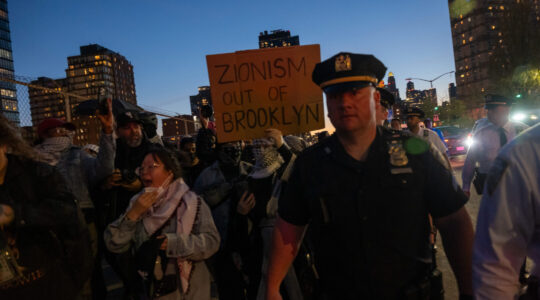As Israeli troops pushed deeper inside Lebanon at midweek in their battle against Hezbollah terrorists, Israeli Prime Minister Ehud Olmert vowed that the fighting would continue until international combat troops moved into southern Lebanon, something some Israeli analysts doubt will occur.
“I don’t think there is going to be an international force,” said Gerald Steinberg, a professor of political science at Bar-Ilan University. “There will be some sort of cease-fire declaration, but no international force.”
Moshe Elad, a former Israeli military official in the territories and a researcher at the Technion’s Shmuel Neaman Institute, also questioned whether other countries would want their soldiers entering “a hostile arena like the one we face today.”
“I don’t see good things happening here,” he said. “If the international force is seen as an enemy, I can imagine a busload of 40 or 50 of them getting hit by a roadside bomb and there would be casualties. I don’t see how countries would accept that calmly. … The international community is expecting a silent and obedient area, and I don’t see how that will happen.”
But Amatzia Baram, a professor of Middle Eastern history at the University of Haifa, said he believes an international force will take up positions in southern Lebanon but not “launch attacks to get rid of [Hezbollah] from positions where we don’t get rid of them.”
That is why, Baram said, that the next few days of fighting are so critical. He said he expects the United Nations Security Council to call for a cease-fire as early as the end of this week, which would give Israel only a day or two more to finish its mission.
“The more Israel does now, the more effective the force will be,” he said. “If we can clear the south [of Hezbollah forces], it would make the situation that much more stable.”
Baram said that had Israeli troops attacked Hezbollah forces from all directions when the war first started July 12, they would have had better success in the war.
“I doubt we will get to all the points where we need to get [before fighting stops], and the situation will be less than good,” Baram said. “We are putting [ground troops] into the battle late in the day. They will be able to accomplish something, although not very much.”
Steinberg said he believes there will continue to be clashes even after a cease-fire is declared.
“It will be limited and maybe confined to within Lebanon itself,” he said, explaining that Hezbollah would attack Israeli troops that establish a buffer zone in southern Lebanon similar to the one they maintained from 1982 though early 2000.
Israeli troops would work during the cease-fire to make sure Hezbollah is not rearmed by Iran and Syria, Steinberg said. And he said Israel hopes to keep Hezbollah north of the Litani River, and thus prevent it from firing Katyusha rockets into northern Israel.
“The critical question is how Hezbollah comes out of the war,” he said. “Will it be significantly weakened or still capable of crossing the border and have a functioning command network. Israel’s goal is to make sure that does not happen.”
The Israeli ground attack by 7,000 troops came as an elite commando unit carried out a daring raid deep inside Lebanon in the Bekka Valley early Wednesday during which they kidnapped five Hezbollah members and killed another 10 before flying away without any casualties. Dan Halutz, the chief of staff of the Israel Defense Forces, said the operation was intended to demonstrate that Israeli forces “can operate in the depth of Lebanon.”
He told reporters that in three weeks of fighting, Israeli forces have struck Hezbollah’s medium- and long-range rocket system and killed more than 300 of their troops. Others have suggested that the figure is between 350 and 400.
But the gains have also come at a price. Three Israeli soldiers were killed in fighting Tuesday, including Sgt. Michael Levine, 21, a native of Philadelphia who was in the United States visiting his family when Hezbollah terrorists crossed the Lebanese border to attack Israeli troops July 12, killing eight and kidnapping two. He immediately cut short his vacation to return to Israel and join his combat unit.
Olmert told reporters that his troops had “entirely destroyed” Hezbollah’s infrastructure. But Steinberg said the Israeli military believes it had “knocked out 70 percent of the long range launchers” of Hezbollah. Some clearly remain because on Wednesday Hezbollah launched a rocket that traveled 45 miles, landing in an open area of the West Bank.
The Hezbollah long-range rocket fire — along with a barrage of Katyshua rockets that killed an Israeli civilian in Nahariya Wednesday — followed a two-day hiatus in attacks. It coincided with Israel’s self-imposed limited suspension of air attacks following an air assault on the Lebanese village of Kana in which more than 60 Lebanese civilians, more than half children, were reportedly killed.
But questions have arisen in recent days that cast doubt on whether the Kana tragedy occurred as Hezbollah and human rights organizations claimed. Several pro-Israel, Jewish and conservative Web logs suggested that the whole event might have been staged to force Israel into accepting a premature cease-fire. Arye Mekel, Israel’s consul general in New York, said he was aware of some of the conflicting reports and that the Israeli military was investigating in an attempt to determine exactly what at Kana.
The International Committee of the Red Cross Mission in Israel said it would ask its Swiss headquarters to also examine the questions raised. Among them was an unexplained gap of about seven hours between the time of an Israeli air strike that hit the building in which the civilians were reportedly housed and the time it was reported to have collapsed. There were also questions about the reported lack of blood on the bodies, raising suspicion that they had been dead several days and placed there to make it appear that the Israeli air raid had killed them.
While the fighting in Lebanon intensified, Israel continued its military operations against Palestinian terrorists this week in the Gaza Strip, as Israeli warplanes bombed a munitions warehouse belonging to Hamas. Navy ships also fired missiles at a storehouse and damaged boats said to have been used to smuggle weapons into Gaza.
Mordechai Kedar, a research associate at the Begin-Sadat Center for Strategic Studies, said reports that a deal involving the release of Cpl. Gilad Shalit might be true if it is part of a larger deal, perhaps involving Hamas assurances that there would be no further rocket attacks from Gaza on Israeli communities. Shalit was kidnapped June 25 in a cross-border raid by Hamas and other terrorist groups.
“The Palestinians are flabbergasted that Hezbollah has captured the world media attention and that now they are left alone with Israel,” Kedar said. “During the last several days, dozens of Palestinian gunmen were killed and nobody seems to care about it. You have no idea how angry the Palestinians are … because they have now been marginalized.”
Although Olmert said Wednesday that he was still determined to proceed with his plan to consolidate Israeli settlements in the West Bank, Kedar said the Palestinians believe that Hezbollah’s attack on Israel will postpone or perhaps even scuttle those plans.
“The Palestinians would like to detach their cause from the Lebanese one because when combined, their cause is in the shade,” Kedar added. “That is because what goes on in Lebanon is part of a much bigger and meaningful [struggle] with the Iranians.”
The New York Jewish Week brings you the stories behind the headlines, keeping you connected to Jewish life in New York. Help sustain the reporting you trust by donating today.




